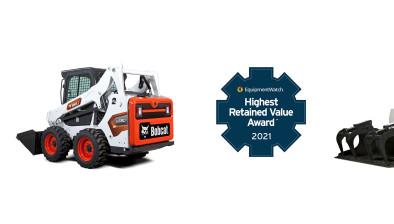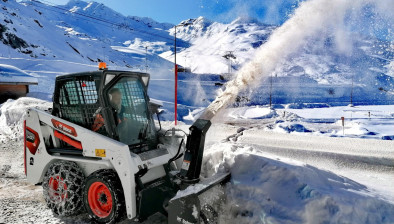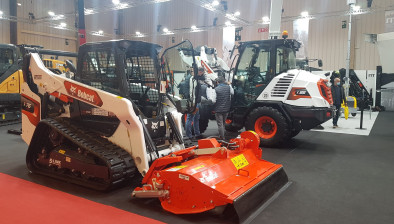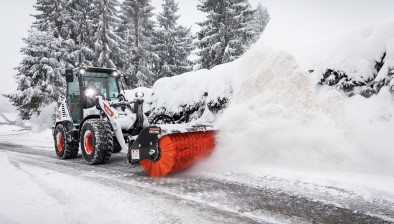Bobcat toughness tackles extreme conditions in Val Thorens
Located at an altitude of 2300 m at the heart of the French Alps, Val Thorens is the highest ski and winter sports resort in Europe.
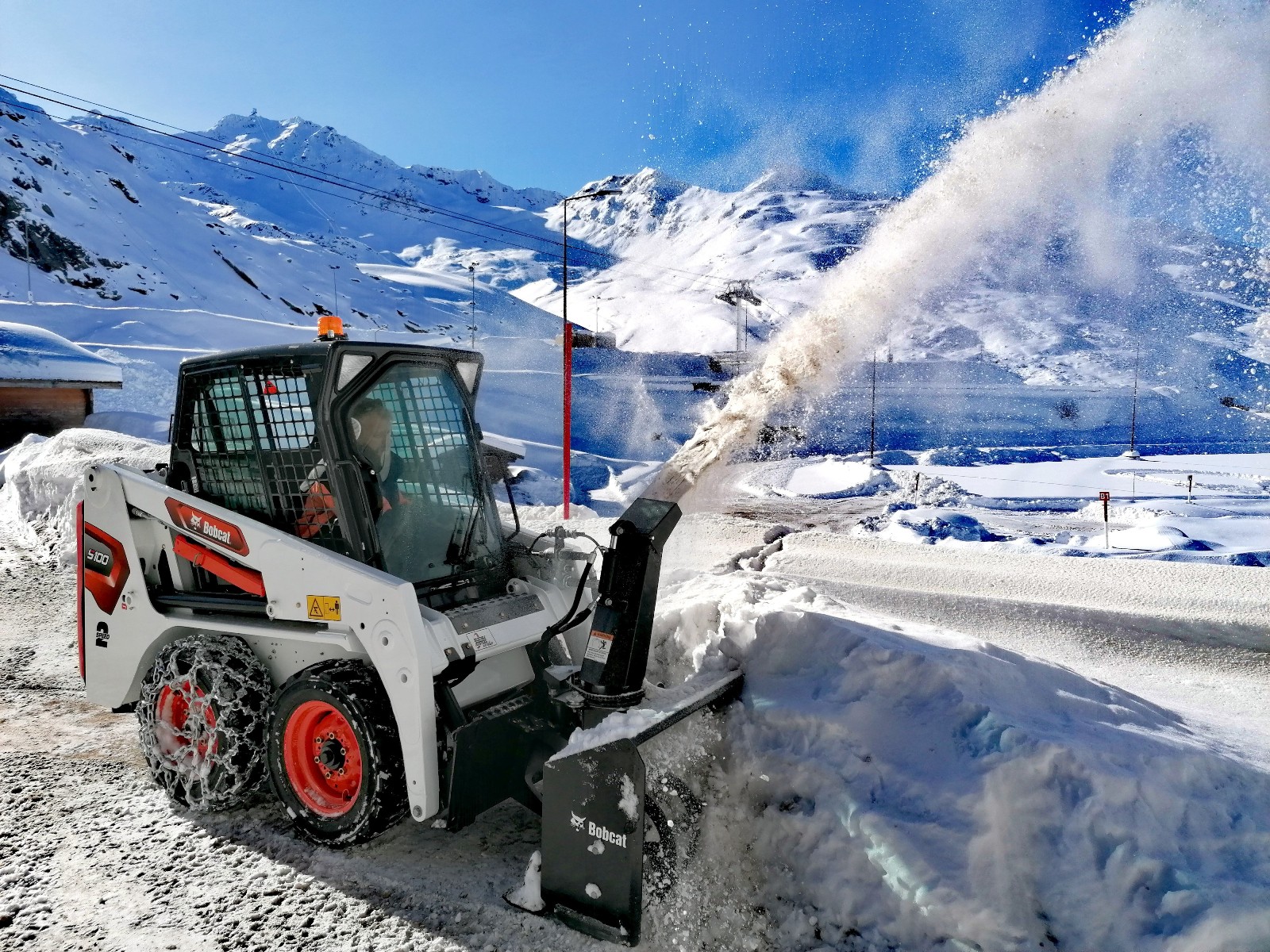
At this altitude, the temperatures are below zero for at least six months of the year. The thermometer can go down to -39°C. It also snows very often and to great depth (on average 6 to 8 m per year), and the wind can blow very hard (sometimes at more than 100 km/h).
Under these conditions only the toughest animals can survive. Similarly, snow removal, road construction and maintenance of the road system in this area requires robust, reliable, compact and manoeuvrable machines. To meet these unusual requirements and to complement its fleet of machines adapted to the mountains, the technical department at the local authority in Val Thorens has chosen a new Bobcat S100 skid-steer loader.
For the delivery of one of the most compact loaders in Bobcat’s portfolio, ITT Mach 10, the Bobcat dealer worked in association with SD MAT, a Doosan dealer. Together they had already delivered a Bobcat S450 skid-steer loader equipped with a snowblower for use in Courchevel, which, along with the resorts of Méribel, Les Ménuires and Val Thorens, is part of the 3 Vallées ski area, known worldwide for its 600 km of slopes.
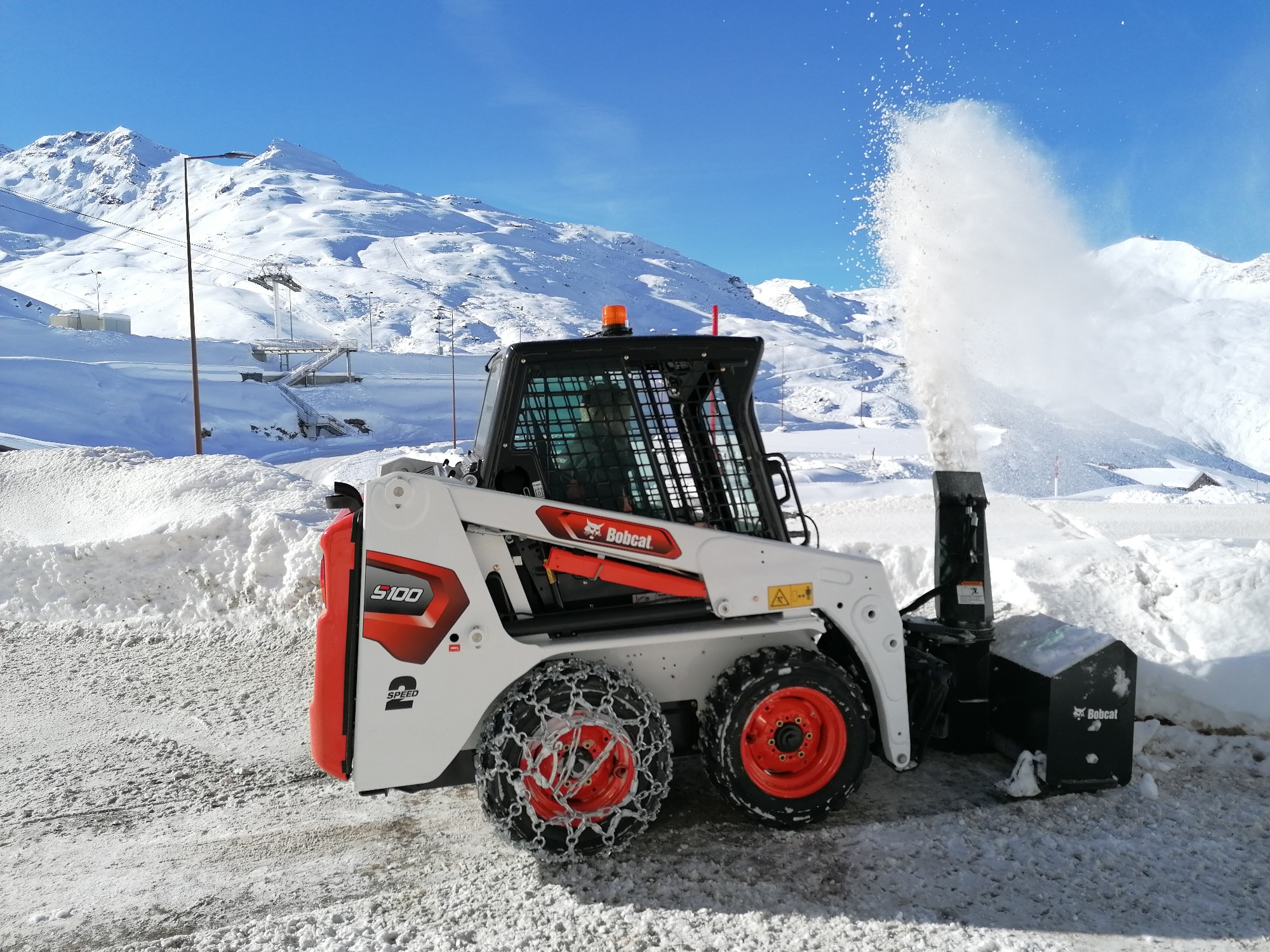
“The new S100 skid-steer loader is equipped with a 1.5 m wide Bobcat snowblower, a bucket, and pallet forks. It has been fitted out to meet the requirements of work in the high mountains, with a closed and heated cab, which is very rare on this model,” said Jéremy Moulin of ITT Mach 10.
The operator’s cockpit (usually equipped with foot/hand controls in this size of skid-steer loader) has been transformed in the factory with a dual manual/joystick control for more comfort and precision. In winter, the operators wear thick shoes to resist the cold but these are not practical for working with pedals.
The loader is also equipped with a special hydraulic line, with a cold-resistant electrical harness that powers the Bobcat snow blower for snow removal. The steerable exit chute allows snow to be discharged up to 15 m in any direction.
Since its delivery, Yann Oget, the technical director of Val Thorens ski resort, has personally operated the machine. “I am always the first one to test the new machines in order to push them to their limits. This allows me to evaluate every aspect of the equipment’s strengths and weaknesses, better adapt and equip them if necessary, and then train the technicians in my team. This S100 skid-steer loader is robust, comfortable, compact and very manoeuvrable. It allows us to do all of our snow removal work, especially on the narrowest pavements and crosswalks that require great precision.”
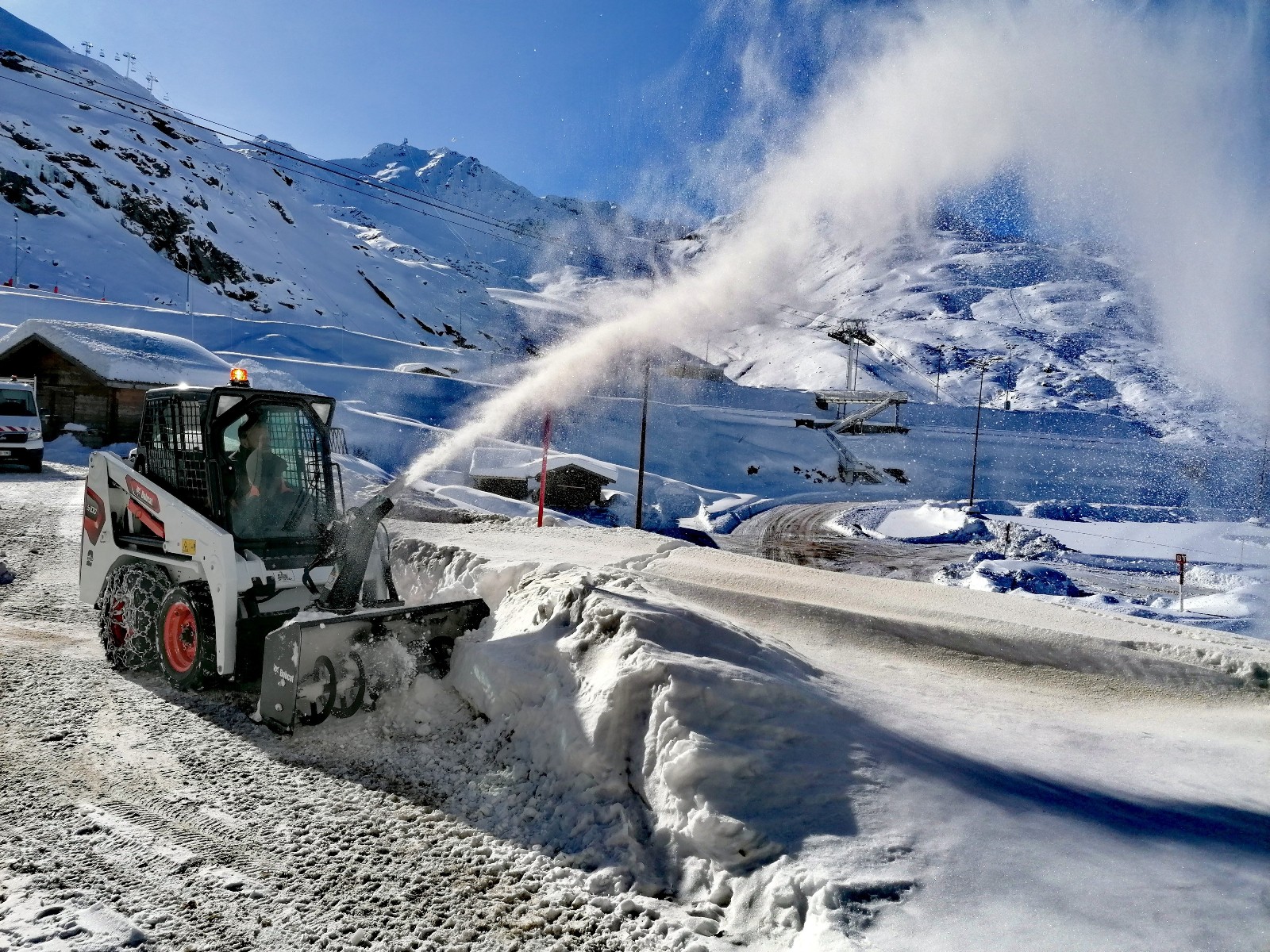
Yann Oget has been a resident of the resort since 1995 and head of Val Thoren’s technical services since 2001, having spent more than 25 seasons here. In winter, he coordinates a team of 21 technicians assigned full-time to the snow removal and maintenance of the resort’s roads and streets. The winter season here is very long, easily lasting seven months from October to late April/early May. “Our work is really dependent on the weather. I spend at least an hour every evening analyzing the weather data in detail. This is what guides the next day’s work plan. At the height of winter, the snow accumulation can reach eight to nine metres in the resort.”
Val Thorens technical services has seven people all year round and up to 21 people between 1st November and 12th May, including nine road workers (people in charge of road cleaning and manual snow removal) and 10 machine and truck drivers. The technical services has a sandblasting truck, seven loaders from 20 to 25 tonne to pile the snow into mounds, which are then removed by the trucks.
Built completely on slopes with sometimes substantial differences in level, the municipality of Val Thorens does not cover more than four km². The urban plan has been thought out to the nearest centimetre. There is no wasted space in Val Thorens. The resort welcomes up to 26,000 people every week during the high season - a population in continuous motion. People come up for different stays (for the week, the weekend, or the day). Traffic must flow smoothly at all times and in all conditions. The Bobcat S100 loader, with tyres equipped with chains, provides quick clearance of the snow and maintains pedestrian crossings throughout the maze of the resort. This is an essential job that keep the ski resort up and running.
In Val Thorens, all the resort’s accommodation is located at the end of the slopes. Snow removal also consists of removing the snow from around the houses, roads and passages. The excess snow is then evacuated by truck to storage areas outside the resort.
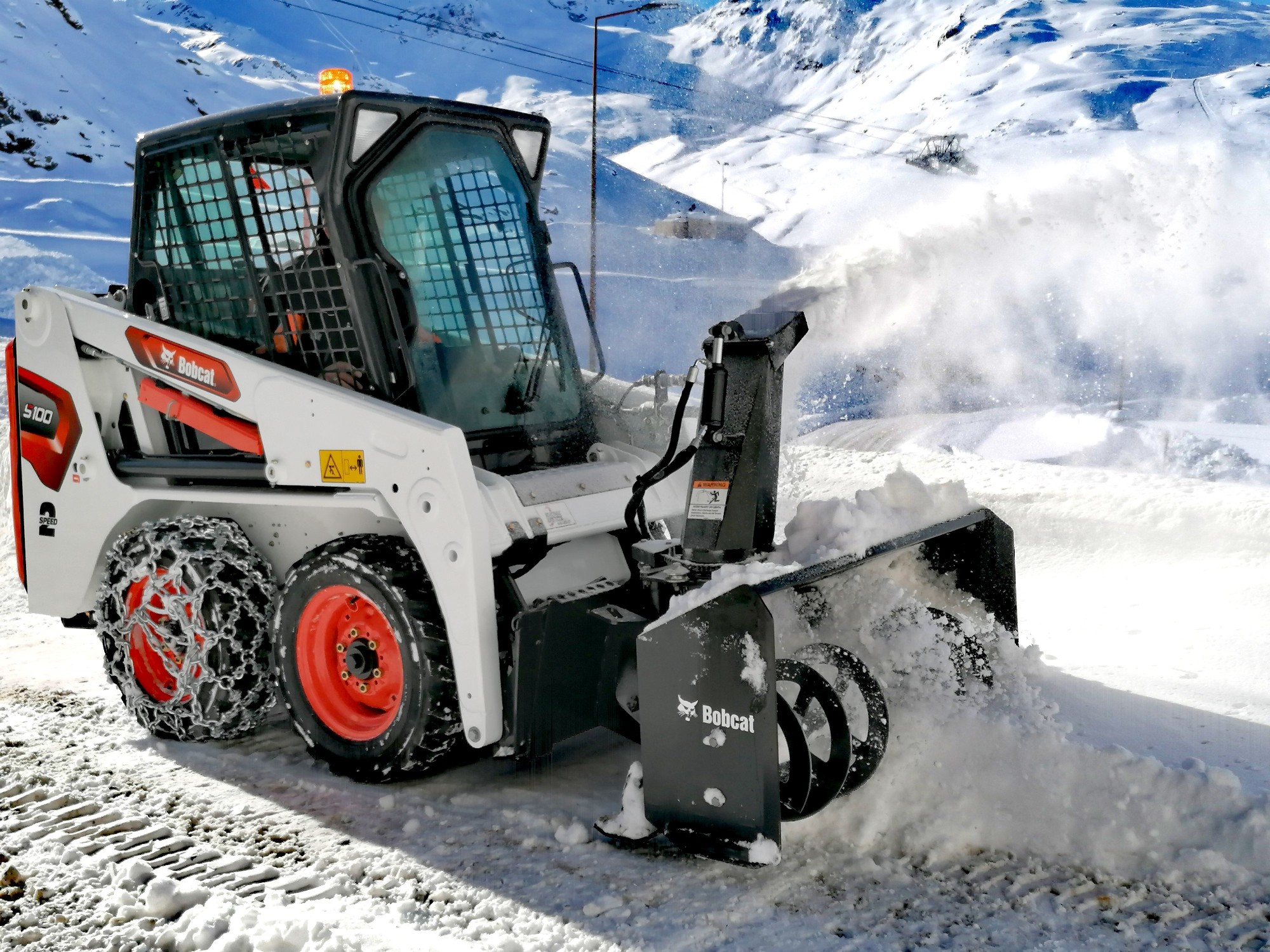
“We cannot make any mistakes. The quality of visits to Val Thorens is measured first and foremost by the access and circulation of people and vehicles around the resort. Val Thorens also has the particularity of being a semi-pedestrian resort where cars are allowed to circulate but not to park outside the parking lots,” adds Yann Oget. The roads are very wide (more than 10 m) to allow cars and dozens of buses to pass each other easily, as well as trucks and large snowplows. “The versatility of snow removal tools is increasingly important and essential. It is this versatility that led us to complete our fleet with this Bobcat S100 skid-steer loader model.”
Yann Oget explains that the resort has adopted a new snow removal strategy based on Canadian methods for the past four years, with just-in-time snow removal. Loading and then evacuating the snow directly by truck optimizes both the team’s and the machines’ working time. “In the end, we go twice as fast for three times less money and we remove three times more snow than most other resorts. The Bobcat S100 skid-steer loader allows us to do this demanding job.”
The daily schedule is particularly tough, with an early wake-up call at 4 am for a 4:50 am appointment at the snow removal centre for a quick coffee and briefing for all. Everybody departs for work at 5 am, each operator with their machine and their sector. The snow clearing is done all day long until 5 pm with a one-hour break at noon.
Of course, if it snows every day, this schedule becomes daily except on Saturday, the arrivals’ day. You have to plan for a 4 am departure and an end-of-day that can go on until 10 pm, or even longer if necessary. “As long as there are vacationers on the road, we must be present to ensure snow removal,” says Yann Oget. And when the snow is gone (never for very long), the work of the technical services team can vary including cleaning and maintaining the machines and the communal buildings.




















